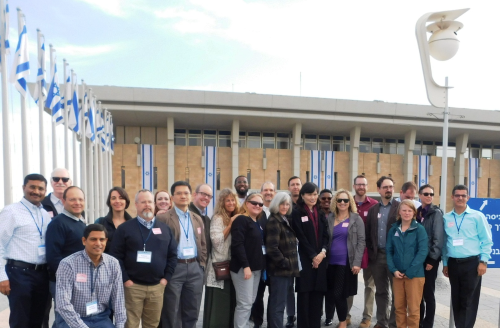
Professors Drop the Books to Experience Classroom Israel
Located in the heart of the Negev Desert, just outside the growing Bedouin community Hura, Lina Alatawna arranges a tasting of fresh labaneh, vegetables, yogurt, and coffee, locally grown and made at Wadi Attir, a Jewish National Fund initiative, in conjunction with Sustainable Laboratories.
Wadi Attir’s mission is to create an integrated, holistic approach to development, relevant to the local Bedouin community, to the region, and to other arid zones around the world. Alatwana, the Director of Organization and Methods at Wadi Attir, and one of the local members of the Bedouin community warmly greeting twenty-five academics and professors from universities across the United States, on JNF’s Winter Faculty Fellowship Program.
Now in its tenth year, the Faculty Fellowship Program in Israel is a competitive academic fellowship that invites full-time university and college faculty members to apply to participate in an all-expenses-paid academic trip to Israel. The program seeks to link scholars from diverse disciplines with their Israeli counterparts at major institutions for the purpose of initiating exchanges and collaborations. As a joint effort between Media Watch International and Jewish National Fund, the Faculty Fellowship in Israel Program builds an exponentially growing impact on campuses across the United States, establishing personal and professional relationships between academic contemporaries that will continue to deepen.
Their meeting at Wadi Attir was exemplary of the program’s goal to introduce the Fellows to various cultural and ethnic minority groups who make up a much more diverse side of Israel than presented on their campuses. For Dr. Abdel Ra’ouf Mayyas, an engineering professor at Arizona State University, this aspect presented a truly eye opening opportunity.
Mayyas, who grew up in Jordan and was given a very myopic understanding of Israeli society, shared “It has been a unique experience to see the whole picture. I’ve only ever seen one side of the spectrum of visibility.”
Specifically, meeting with Alatawna and the other members of Project Wadi Attir provided a new prospective on the role on women in Research and Development, especially in otherwise traditional local communities. “I’ve always been fascinated with what this small country has accomplished. I would follow research from Tel Aviv and Ben Gurion Universities, and found myself astonished with Israel’s level of accomplishment,” he added.
On a professional level, this experience also offers Fellows unparalleled academic cooperation with their Israeli counterparts, presenting new and innovative research in their shared disciplines. For many, this is one of the most valued aspects of the program.
“I have the opportunity to learn and work with my contemporaries from some of the most prominent engineering institutions in the world,” said Jeremi London, also a professor of engineering at Arizona State University. “We hope to host an international engineering conference at ASU in 2021.”
For Dr. London, she cannot wait to share her experiences and new connections with her colleagues back home. “Most people are unaware of the impactful and meaningful work coming out of Israel. I hope this conference will connect more engineers to work together, both within and outside of Israel.”
While all the Fellows shared London’s enthusiasm for collaboration with their Israeli counterparts, Dr. Arun Pillutla, professor of business strategy at St. Ambrose University, offered a broader view of Israeli academia. “Following my meeting at Sapir College in Sderot, I was most impressed with Israel’s highly multicultural, motivated, and merit oriented atmosphere. They have such a ‘get it done’ attitude.”
Aside from the professional growth offered through the program, many Fellows felt empowered to return to their campuses, as advocates for pro-Israel collaborations. For Allison Welch, an ethnomusicologist from Texas, this program revealed how much more work there still is that needs to be done on campus.
“A lot of my friends just say that it is complicated,” said Welch, commenting on the sociopolitical misconceptions among many of her contemporaries. “But, there is a lot of hope here. We saw so many programs that are helping diversity and multiculturalism and I specifically loved meeting with Sephardic musical composers here in Israel.”
For Welch, the trip does not end when she returns home. Rather she plans to encourage many more professors to take advantage of this opportunity, and expand their understanding of Israeli culture and academics.
Dr. Brian Marks, a piano professor at Baylor School of Music offered, “I cannot imagine any kind of group ever having the same kind of experience as we just had. It has been so valuable to get to know so many academics, from such a wide variety of backgrounds, religions, and nationalities.”
Since its inception, the Faculty Fellowship Program in Israel has brought over 200 academics from more than 100 universities to Israel, planting the seed for not only the participants, but their students and colleagues in the United States, to gain a deeper awareness of the many challenges faced by Israel, but also the creativity, spirit and ingenuity that Israelis bring to tackling these issues.
To learn more about the program and to apply, please visit http://www.ff2israel.org/ or call Rene Reinhard at 212-879-9305 x235.
